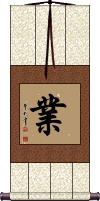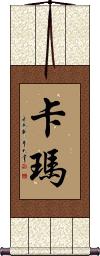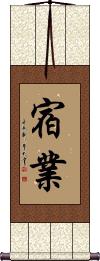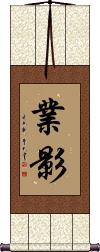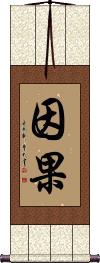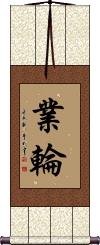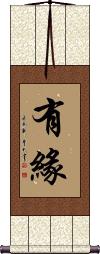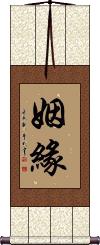Many custom options...
And formats...

Karma in Chinese / Japanese...
Buy a Karma calligraphy wall scroll here!
Personalize your custom “Karma” project by clicking the button next to your favorite “Karma” title below...
Karma
Single character for Buddhist Karma
This is the simplest way to express the idea of Karma. This is the Buddhist concept of actions committed in a former life affecting the present and future.
Out of the context of Buddhism, this Karma character means one's profession in life, trade, occupation, business, study, or career.
The Karma definition applies to both Chinese and Japanese for this character. This also works as Korean Hanja as Karma; although the meaning can vary depending on context (my Korean dictionary gives the definition of profession/occupation).
See Also: Buddhism
Karma
Transliterated personal name
卡瑪 is the most common transliteration to Mandarin Chinese for the name Karma.
Note: This sounds like Karma but does not have the meaning of Karma in Chinese. See our other entry if you are looking for the Buddhist idea of Karma.
In fact, if your name is Karma, I strongly suggest that you use a word that means Karma, rather than this one that sounds like Karma (meaning is more important and universal in Chinese/Japanese/Korean).
Karma (of your past lives)
宿業 is the Buddhist concept of Past Karma. Simply put, it's the sum of all the good and bad from all previous lives (perhaps earlier in your current life). This term is not commonly used outside of the Buddhist faith (you'll have a tough time finding a non-Buddhist Asian person that knows this word).
Other ways to translate this are “The karma of previous existence,” “The karma remaining from prior existences,” or simply “Former karma.”
See Also: Buddhism
Shadow of Karma / Dogged by Karma
Karma - Cause and Effect
Wheel of Karma
Karma Connection
有緣 means: related; brought together by fate; same karma; those who have the cause, link, or connection.
有緣 is a common word in Chinese but usually only used in the context of Buddhism in Japanese.
Buddhists will say this refers to those that are influenced by and responsive to the Buddha.
The Karma/Fate/Destiny that Brings Lovers Together
姻緣 means “Destiny that brings lovers together.” It can also be translated technically as “Predestined matrimonial affinity” (wow, talk about taking the romance out of this word - that was from the Oxford C-E dictionary).
This speaks to the fate (or karma) that brings a husband and wife together. I would translate this as “Together by fate” or “Joined by destiny” but in the context of marriage. You could use this for non-married lovers, but the first character has a suggestion that this refers to those that are married.
These search terms might be related to Karma:
Brought Together From 1000 Miles Away by Fate
Choose Your Own Destiny
Destiny
Destiny / Fate
Destiny Determined by Heaven
Dragon and Phoenix Brings Luck
Fate / Chance Meeting
Fate / Opportunity / Chance
Fortune Favors the Bold
Fortune Favors the Brave
Good Luck
Good Luck / Good Fortune
Happiness / Fortune / Lucky
House of Good Fortune
I Am the Master of My Destiny
I Control My Own Destiny
Kismet
Opportunity / Good Luck
Optimism / Happy With Your Fate
Predestined Love / Love by Fate
Serendipity / Chance Discovery
Serendipity / Happy Coincidence
Serendipity / Lucky Coincidence
Serendipity / Nice Coincidence
Soldier of Fortune
Such is Life / Such is Destiny
Tea Fate
The Karma/Fate/Destiny That Brings Lovers Together
The Red Thread of Fate
Wealth / Fortune / Riches / Abundance
Wealth / Riches / Fortune
The following table may be helpful for those studying Chinese or Japanese...
| Title | Characters | Romaji (Romanized Japanese) | Various forms of Romanized Chinese | |
| Karma | 業 业 | gou / go | yè / ye4 / ye | yeh |
| Karma | 卡瑪 卡玛 | kǎ mǎ / ka3 ma3 / ka ma / kama | k`a ma / kama / ka ma | |
| Karma (of your past lives) | 宿業 宿业 | shukugou / shukugo | sù yè / su4 ye4 / su ye / suye | su yeh / suyeh |
| Shadow of Karma Dogged by Karma | 業影 业影 | gou you / gouyou / go yo | yè yǐng / ye4 ying3 / ye ying / yeying | yeh ying / yehying |
| Karma - Cause and Effect | 因果 | inga | yīn guǒ / yin1 guo3 / yin guo / yinguo | yin kuo / yinkuo |
| Wheel of Karma | 業輪 业轮 | gōrin | yè lún / ye4 lun2 / ye lun / yelun | yeh lun / yehlun |
| Karma Connection | 有緣 有缘 | uen | yǒu yuán / you3 yuan2 / you yuan / youyuan | yu yüan / yuyüan |
| The Karma/Fate/Destiny that Brings Lovers Together | 姻緣 姻缘 | yīn yuán / yin1 yuan2 / yin yuan / yinyuan | yin yüan / yinyüan | |
| In some entries above you will see that characters have different versions above and below a line. In these cases, the characters above the line are Traditional Chinese, while the ones below are Simplified Chinese. | ||||
Successful Chinese Character and Japanese Kanji calligraphy searches within the last few hours...
